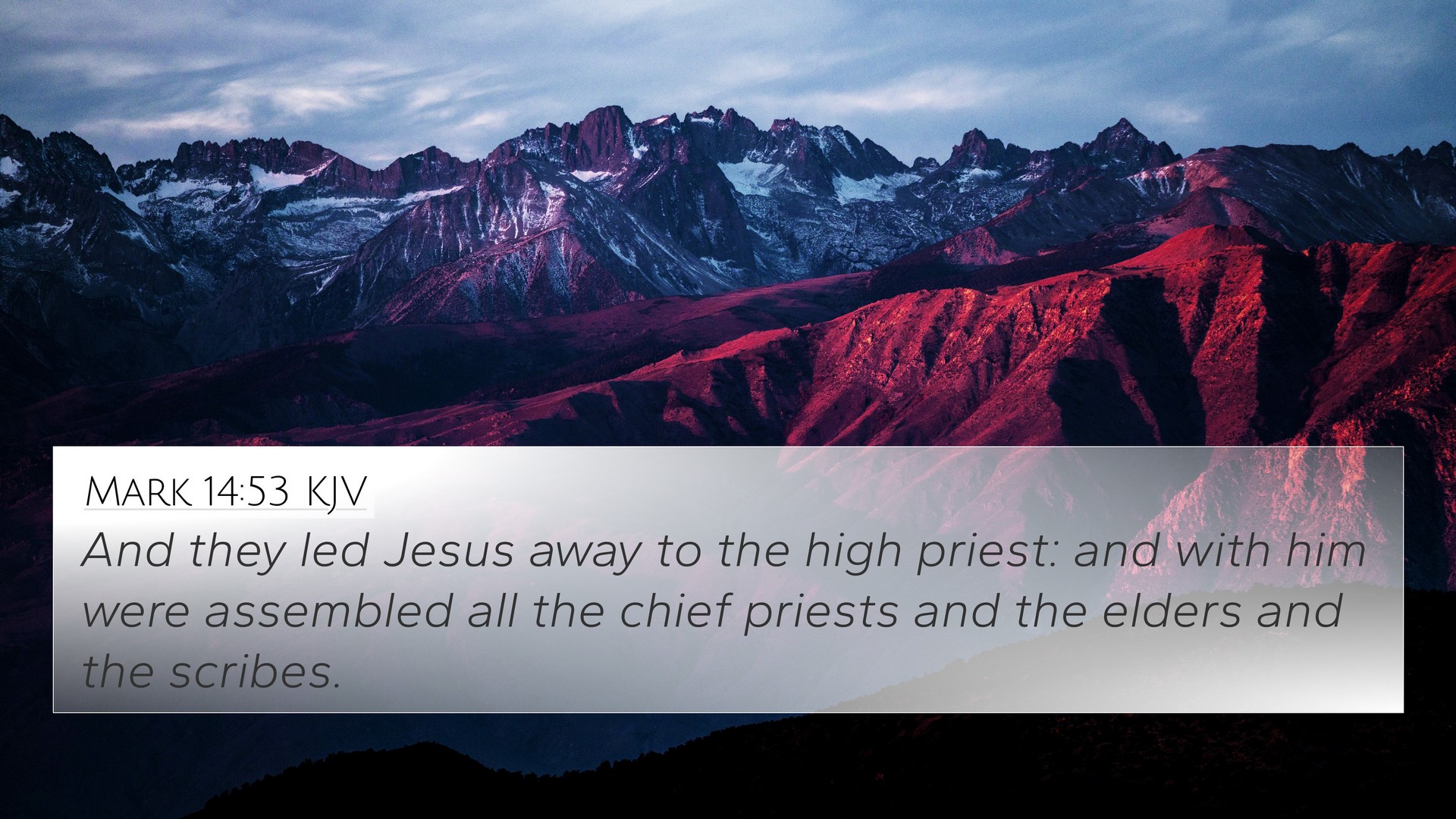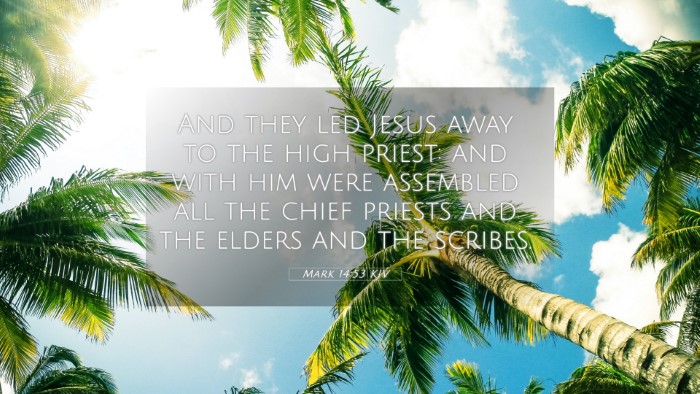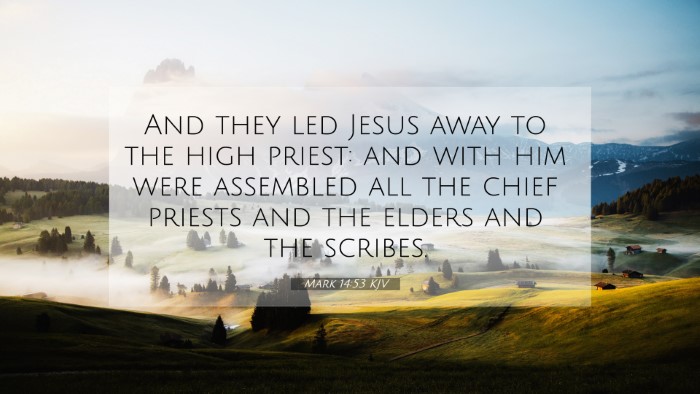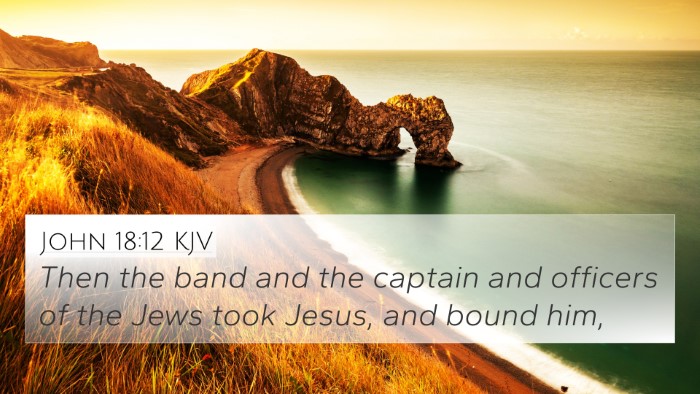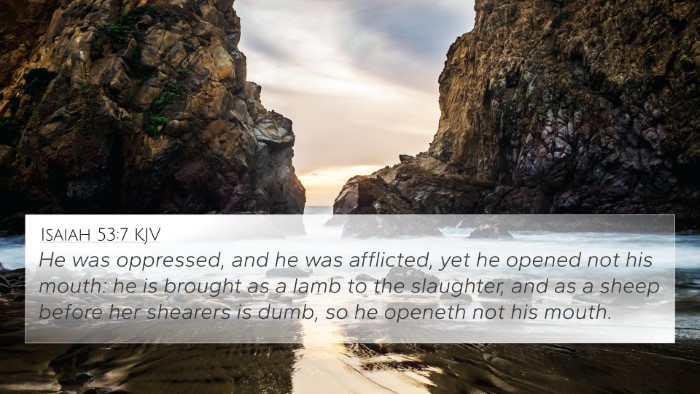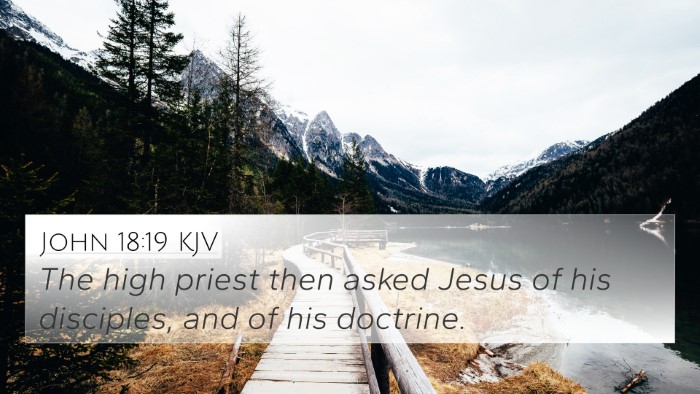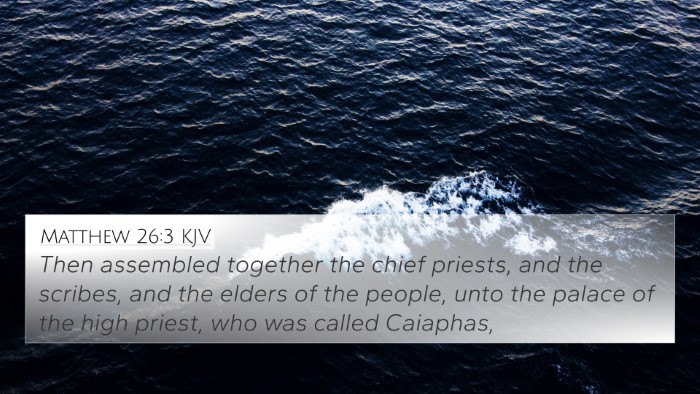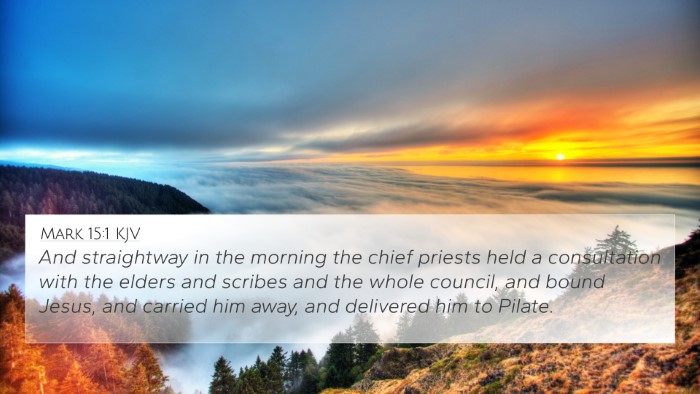Bible Verse Interpretation of Mark 14:53
Mark 14:53 states, "And they led Jesus away to the high priest; and with him were assembled all the chief priests and the elders and the scribes." This verse captures a pivotal moment in the passion narrative, focusing on the trial of Jesus. Below, we summarize insights from esteemed public domain commentaries, including those of Matthew Henry, Albert Barnes, and Adam Clarke, synthesizing their interpretations.
Context and Meaning
The context of Mark 14:53 is essential for understanding its significance. This verse occurs after Jesus' arrest in the Garden of Gethsemane, marking the transition toward his crucifixion. It sets the stage for the judicial proceedings against Jesus, reflecting the culmination of various plot points against him. Through the eyes of the disciples and the readers, this moment carries emotional weight, foreshadowing the betrayal and suffering that is soon to unfold.
Commentary Insights
Matthew Henry’s Commentary
Matthew Henry emphasizes the unlawful and unjust nature of the trial that Jesus faces. He points out that the leaders of the Jews, motivated by envy and fear, orchestrated a series of events to bring Jesus to trial. Henry notes that the gathering of the chief priests, elders, and scribes signifies the united opposition to Jesus, highlighting the conspiracy against him. He reflects on the spiritual blindness that grips these leaders, who fail to recognize the fulfillment of prophecy in Jesus’ actions.
Albert Barnes’ Notes
Albert Barnes provides a thorough analysis of the geographical and social implications of Jesus being led to the high priest. He notes that this movement signifies Jesus' transition from public ministry to a trial dominated by political and religious leadership. Barnes underscores the implications of the phrase "led Jesus away," viewing it as emblematic of his sacrifice. He suggests that this path mirrors the prophecies that foretold Jesus' suffering and underscores the foreordained nature of these events.
Adam Clarke’s Commentary
Adam Clarke focuses on the composition of the assembly that follows Jesus. He identifies the high priest as a key figure who represents the religious authority, alongside the elders and scribes who collaborate against Jesus. Clarke suggests that this coalition reflects the broader theme of rejection that permeates the Gospel narrative. He also draws connections between this moment and the prophetic anticipations within the Jewish tradition, reinforcing the idea that Jesus' suffering was foretold.
Thematic Connections
Mark 14:53 serves as a vital connection point within the biblical narrative. Several themes emerge from this verse that resonate throughout both the Old and New Testaments:
- Fulfillment of Prophecy: The trial of Jesus aligns with prophecies found in Isaiah 53 and Psalm 22.
- Divine Sovereignty: Jesus’ trial underscores God's sovereign plan in the face of human opposition, relatable to Acts 2:23.
- Rejection and Betrayal: The collaboration of religious authorities reflects Jesus' rejection as foretold in Psalm 118:22.
- Themes of Injustice: The trial is steeped in injustice, echoing the experiences of the righteous suffering in the Book of Job.
- Leadership and Responsibility: The roles of the high priests and elders illustrate the dangers of corrupt leadership as seen in Jeremiah 23:1-4.
- Public Mockery: Jesus becomes a spectacle to the crowd, paralleling the scorn faced by those who embody righteousness (Psalm 69:7).
- Divine Silence: Amidst the mockery and accusations, the silence of Jesus recalls the prophetic silence of the suffering servant (Isaiah 53:7).
Related Bible Cross-References
Mark 14:53 shares significant cross-references that enhance understanding through thematic connections:
- Matthew 26:57-68: Details of Jesus' trial before Caiaphas.
- Luke 22:54-55: The gathering of the authorities after Jesus’ arrest.
- John 18:12-14: The introduction of Peter’s denials amidst Jesus' trial.
- Isaiah 53:3: Prophecy describing Jesus as despised and rejected.
- Acts 3:13-15: Reflection on the Jewish leaders’ role in Jesus’ suffering.
- Psalm 2:1-2: God's anointed being opposed by earthly rulers.
- Zechariah 13:7: Smite the shepherd, and the sheep will be scattered.
- John 3:19: The world’s judgment upon the light when people loved darkness.
- Hebrews 12:2: Jesus, the author and finisher of our faith, who endured the cross.
- 1 Peter 2:23: Jesus, when insulted, did not retaliate; he entrusted Himself to God.
Using Bible Cross-References
Understanding and utilizing cross-references is essential in deepening biblical study. By employing tools for Bible cross-referencing, readers can:
- Find thematic connections across different scripture passages.
- Engage in a comparative Bible verse analysis to uncover deeper meanings.
- Identify how the Old and New Testaments interconnect, enriching one’s theological understanding.
- Utilize a Bible concordance to trace particular themes throughout scripture.
- Leverage comprehensive Bible cross-reference materials for sermon preparation and personal study.
- Engage in cross-referencing Bible study methods to uncover dialogues between different biblical texts.
Conclusion
Mark 14:53 stands not only as a record of historical events leading to the crucifixion but also as a rich tapestry of theological themes. Through the insights drawn from multiple commentary perspectives and the inherent cross-references, readers gain a deeper, interconnected understanding of Jesus' suffering and the fulfillment of divine prophecy. This verse serves as a crucial link in the broader narrative of redemption, calling students of the Word to explore the intricate dialogue within Scripture.
